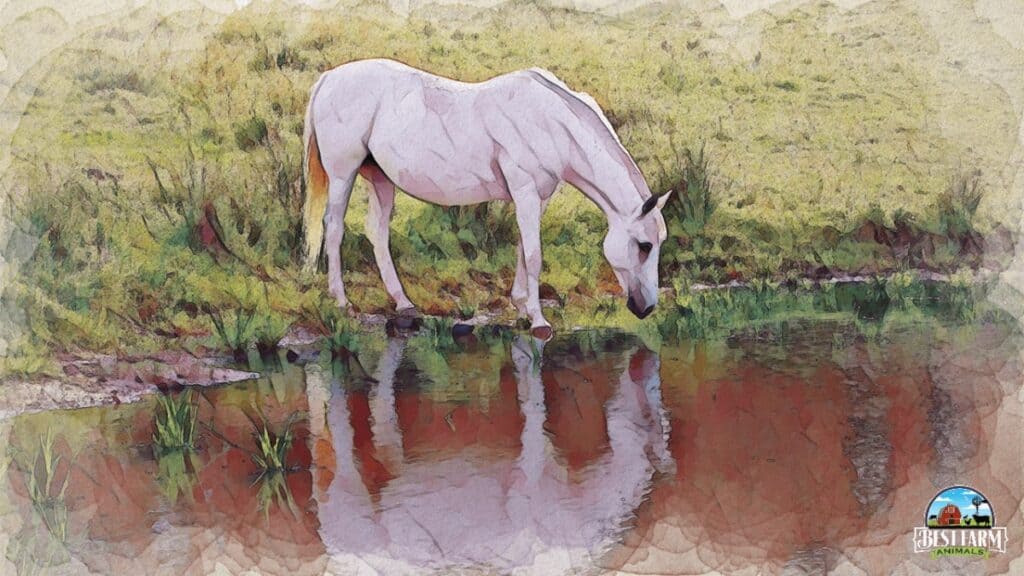While you’ve heard the adage that you can’t take a horse to water and make them drink, it’s sometimes necessary to make them drink. Horses need enough water to keep their gut hydrated and to ensure they have enough fluid in their large bodies to keep their systems functioning optimally.
Sadly, some horses don’t want to drink. What then?
There are ways to help your horse drink more water, especially when they are dehydrated from exercise, illness, or the weather. Knowing how to help your horse drink more is vital to ensure they don’t colic or suffer severe dehydration.
How can you make a dehydrated horse drink? Horses drink water in reaction to a thirst instinct. Only once they feel the need will they drink. To help your horse drink more water when they are dehydrated, you can try sweetening their water, adding an electrolyte to encourage the thirst response, or soaking their food. Oral electrolyte supplements help a horse drink and hydrate correctly.
If you suspect your horse is dehydrated, you can take the following steps to begin remedying the situation while assessing how severely dehydrated your horse is.
What Will Make a Dehydrated Horse Drink More Water?
A dehydrated horse will sometimes refuse to drink water, and in severe cases, you may need the assistance of a vet to help rehydrate your horse. Knowing how to stimulate the thirst response that makes a horse drink is vital to helping a dehydrated horse to drink or consume more water. A horse can rehydrate without drinking water, if you need to help them in a crisis.
How Long Does It Take For a Horse to Rehydrate?
How long it takes for a dehydrated horse to rehydrate fully depends on the severity of the dehydration, the horse’s overall health, and the weather. If your horse’s overall health is good, they can rehydrate within a few hours, and some horses merely need for the cause of the dehydration to be removed to regain their water balance.
Usually, a horse with mild dehydration needs access to fresh water and an hour or two to fully hydrate their organs and cells. But a horse with severe dehydration may not be able to recover from simply drinking water, and they will need careful and continuous monitoring to ensure their electrolyte balance is maintained while rehydrating or they will lose more water.
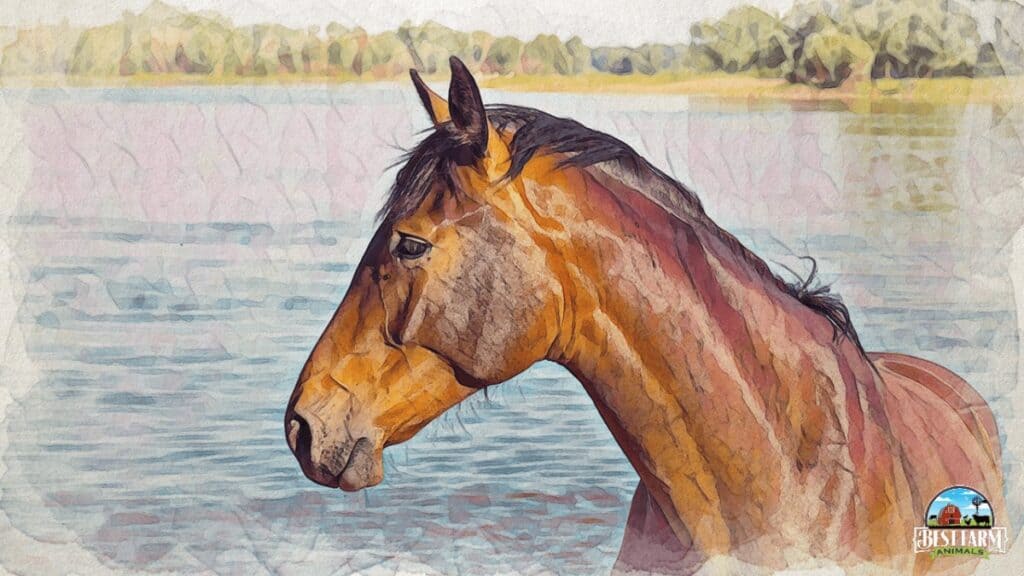
10 Ways to Make a Dehydrated Horse Drink Water
There are a few proven ways to hydrate a horse or increase their water intake when they are dehydrated. These are all ways that naturally help the horse to increase their water intake without forcing them to drink.
And, in case you were wondering, it’s not advisable to “syringe” water into the horse’s throat. The risk of water entering the horse’s lungs is too great, which could lead to pneumonia and even death from a secondary infection. But back to the ways you CAN help your horse drink more water.
1. Free Access vs. Withholding Water
I have encountered a few horse owners who insist they encourage the horse to drink by withholding water. Please don’t believe this for a second. Horses need ad-lib or free access to water, all day and night long. Even if your horse tends to urinate often during the night, you should still give them as much water as needed. The one exception is if they have a medically diagnosed condition and you’ve got different instructions from your vet.
Ensure your horse has access to at least 10 gallons of water per night. You can also try out different water containers as some horses will not drink out of a metal container, while others refuse to drink from plastic.
2. Check Water Frequently
I like to draw a measuring line on my horse’s water container. This helps me check how much water they have drunk during the night in their stable or during the day in camp. If I notice they haven’t drunk as much water as is typical for them, I check them with a snap test and assess their vital signs.
That said, there are also nights when I’ve seen my youngster sleeping like a log for a good 4-5 hours! Not much drinking or eating is happening then, so I’m not at all surprised to find a full water bucket in the morning.
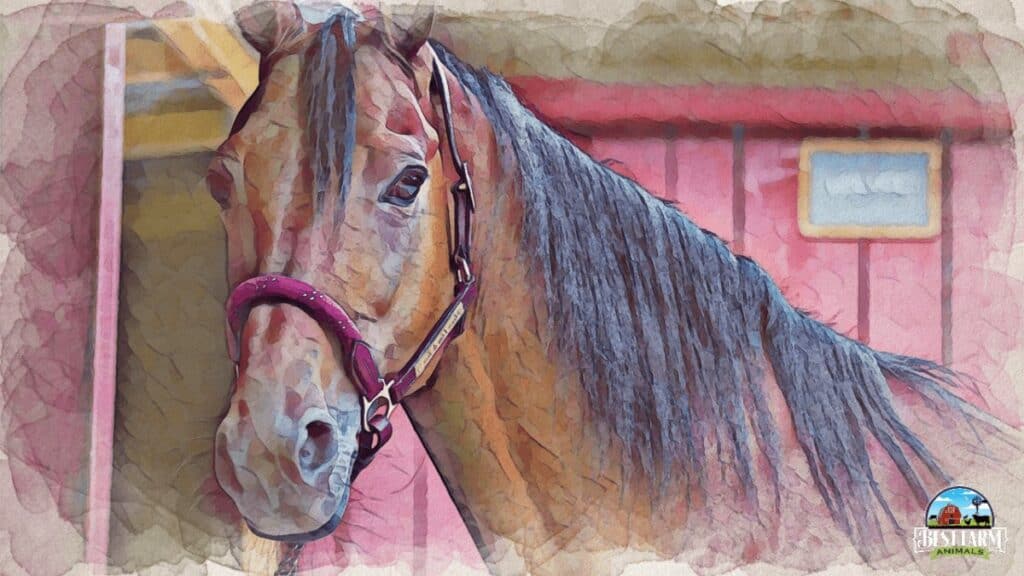
3. Mix Water Into Feed
If your horse is not drinking enough water or if you have already begun to notice dry stool and colicky behavior, you may need to force your horse to get more fluids in gently. Adding more water to their daily feed is an excellent way to do this.
You can mix your horse’s ration of concentrate or sweet feed with enough water to almost be soupy. Most horses will happily slurp this up, getting in a good couple of ounces in water too.
4. Add Salt to Feed
You can also add salt to your horse’s feed. Adding in as much as two tablespoons of agricultural salt or pink Himalayan salt to your horse’s feed will help your horse become more thirsty. Initially, you may want to introduce the salt gradually. I like to start with no more than a teaspoon of salt at a time.
5. Soak Beet Pulp
Another great way to help your horse hydrate is adding a couple of beet pulp handfuls to your horse’s feed. This is soaked in at least a gallon of water and fed to your horse. If you use warm water to soak the pulp, wait for it to cool down before feeding.
Don’t be frightened by the volume of the food once the beet has expanded, and while it may weigh more than the recommended feed weight per meal, it is mostly water, so you can still feed it to your horse in one meal. To be safe, weigh the dry beet pulp and the sweet feed before adding in the water. The dry weight shouldn’t exceed 4.5 pounds per meal.
6. Alternate Water With Fruit Juice
If your horse is stubborn about drinking their water and the usual tricks haven’t helped, you can also feed them some watered-down apple juice. This can entice your horse to drink more water. Plus, adding fruit sugar can also benefit a dehydrated horse.
Can you put apple juice in a horse’s water? Apple juice can be added to a horse’s water, but mix it strong enough to make the water taste sweet. Try using a smaller bucket with a gallon of water and half a gallon of apple juice, but also provide a secondary bucket with fresh water (at least 10 gallons) so the horse can drink water when the apple juice makes them thirsty.
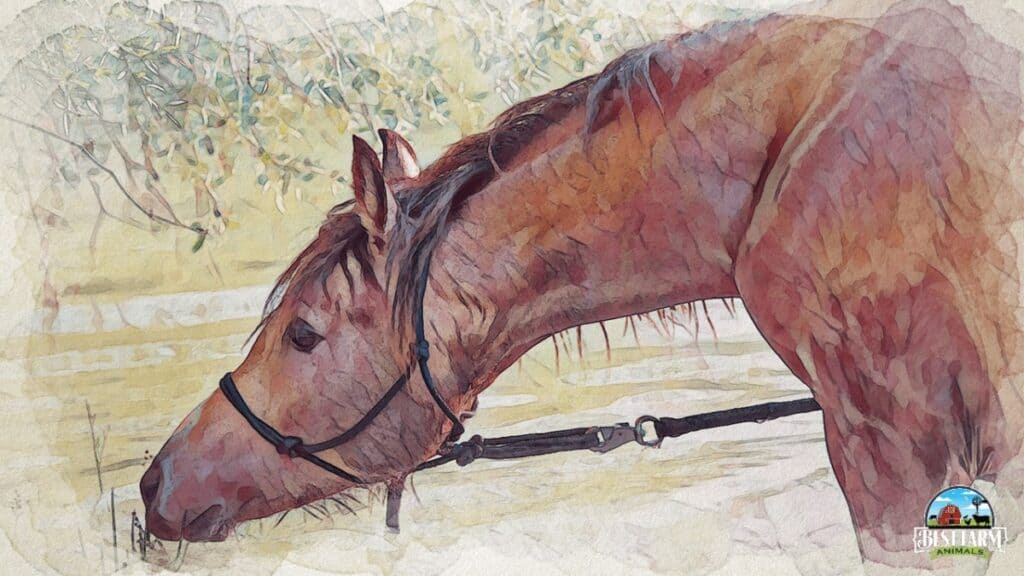
7. Sweetwater
On the topic of sweet things, I have also seen the effectiveness of “sweetwater.” This is when you take a 5-10 gallon bucket of water and add a good molasses dollop. The water will have a typical molasses smell and taste, which will help your horse drink much more willingly.
With a colicky horse, you may choose to offer your horse sweetwater as this will help the horse drink more water. Be sure to have both sweetwater and plain fresh water in the stable or paddock for your horse.
Like a kid who eats too many sweets and is then thirsty, your horse will want to drink some fresh water too once they have drunk some of the molasses water.
8. Rule out Other Conditions
If your horse has become dehydrated, there may often be a different reason for its loss of water. Illness, trauma, and even stress may cause a horse to dehydrate. Your horse may be sharing a paddock with other horses that are aggressive and won’t allow your horse to drink.
This could mean your horse will be dehydrated. Offer your horse water and check for signs of agitation—it may be as simple as changing your horse into a different paddock to solve this dehydration issue.
9. Call a Vet to Administer IV Hydration With a Drip
Should your horse begin to display the signs of dehydration above, including dull and lifeless eyes, lethargy, lack of appetite, or fever, be sure to call the vet immediately! Administering an IV drip to hydrate your horse may be required to save their life if they are beyond the point of normal recovery.
Do Horses Only Drink Clean Water?
Would you drink from a dirty glass? If your horse’s water bucket is dirty or they have muddy water to drink, they won’t be likely to drink it. A horse prefers clean water that is free from bad tasting particles or organisms. While they may drink from a muddy dam in their paddock, it’s better to only provide clean water daily in the paddock and stable.
Scrub your water buckets daily to prevent the buildup of bacteria and mold.
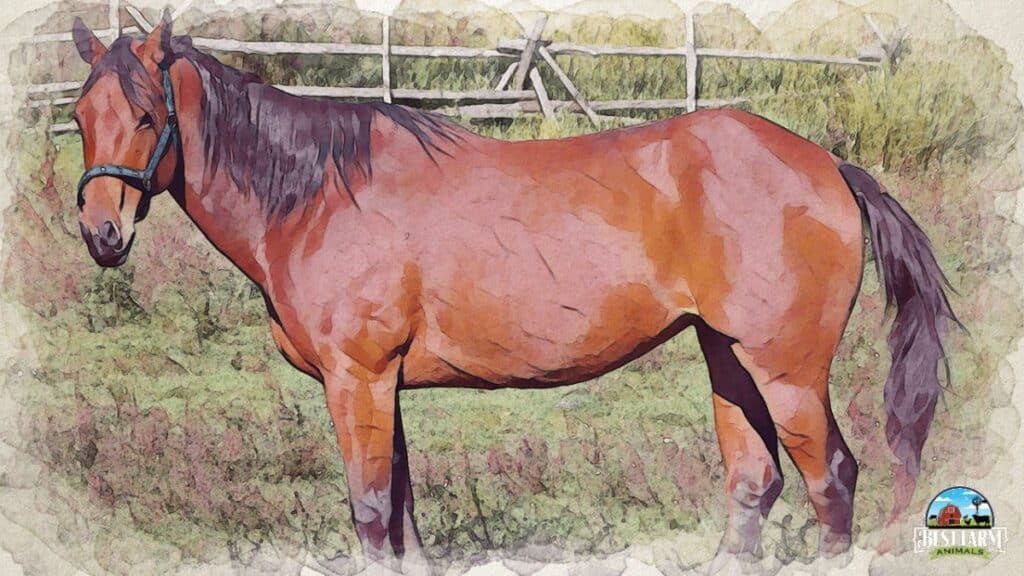
Situations That Should Involve Water Caution
While your horse should have water at all times of the day, there are a few rare times when you should not give your horse water, and you should actually remove the water from their stable.
Hot Horses Can Struggle With Choking While Drinking
You should hand-walk your horse to cool down if you have just worked your horse or had a long ride. This will ensure your horse can drink its water without choking or having an adverse reaction.
A hot horse from work will have an elevated breathing rate and heart rate, which can cause them to have a heart attack if you let them drink too much water immediately.
Post-Surgery Horses May Gulp Water
When a horse is under anesthesia or sedation, it will be disoriented after the surgery or medical procedure. The horse may be so disoriented that it gulps the water, choking or suffering a blockage. This is why many vets or equine dentists recommend that you remove all water and hay for 3-4 hours while your horse wakes up.
Certain Medical Conditions: Your Horse Drinking Too Much Water
Some diseases such as Cushing’s disease and even equine metabolic syndrome (EMS) can lead to a horse drinking too much water. This will result in too much pressure on your horse’s body systems and kidneys.
If your horse has a medical condition that requires management, you should only give your horse water as needed and avoid free-choice water.
Water Is Contaminated And Isn’t Safe For Horse Hydration
If you suspect the water your horse is about to drink is contaminated, you should prevent your horse from drinking it. Bacterial and parasitic infections can result from your horse drinking contaminated or polluted water. This is a necessary time to dehydrate your horse to prevent them from drinking toxic water.
Extreme Cold Can Cause Colic When Horses Drink
Extreme cold is not favorable to your horse’s water consumption. Most natural places to drink, such as streams and rivers, are usually frozen. Your horse will get colic from trying to drink frozen water.
If you live in the colder northern States, and your horses have access to a barn or a shelter, you can provide them with heated water. This will ensure your horse can drink water at the recommended temperature range.
Frequently Asked Questions
Does my horse need constant access to water? Yes, your horse will require 24/7 access to water unless you have been advised to withhold water by your veterinarian or if your horse has just undergone a medical procedure that involves sedation or anesthesia. In that case, you should withhold water until they are fully awake and alert.
Can a horse go overnight without water? Horses can go possibly 48 hours without water, but not without physical damage from dehydration. Although going all night without access to water probably won’t kill your horse, do not withhold water from your horses at night. This can cause prolonged dehydration and affect their overall health.
What are the signs of dehydration? Common signs of dehydration include a lack of skin elasticity. Additional signs include listlessness, dry and red eyes, colic, and a lack of appetite. In severe cases, a loss of appetite and sudden incoordination can be signs of dehydration. In a severely dehydrated horse, the mucus membranes of the mouth and eyes become sticky and dry.
What can horses drink other than water? Horses can get fluid from juices such as apple and carrot juice, but beware of processed juice that contains preservatives and additives that can lead to a loss of electrolytes. Other sources of water include water-rich fruit like cucumbers, apples and leafy greens like lettuce. But nothing beats good clean water.
My Favorite Equine Resources For Horses and Donkeys
This list contains affiliate products. Affiliate products do not cost more but helps to support BestFarmAnimals and our goal to provide farm animal owners with accurate and helpful information.
Squeaky Chicken Toy is hilarious to watch and the horses love it! It’s not super tough so keep it away from dogs.
Dewormer with Ivermectin: I use this for my horses and my goats. Duvet makes a great dewormer. I switch between the Ivermectin one and one like this one so the worms don’t get immune to it.
Manna Pro Apple Flavored Nuggets are a delicious smelling treat that my horses go crazy over.
Equinity Amino Acid Supplement for Horses makes a big difference for any horse that’s struggling with arthritis, hoof issues, or just generally. It’s great for older horses who can’t absorb all the nutrients in their food as well!
Manna Pro Weight Accelerator helps older horses gain weight and stay healthier! This was especially helpful when one of my older horses lost weight over the winter and helped her regain her weight over the summer!
Farnam Fly Control goes on the horse or donkey and will keep the flies off your sweet pet. It makes horses way more comfortable and will keep sores from getting infected as well.
Wound Kote protects sores and wounds. It acts as an antiseptic and helps wounds heal faster. It works on both my horses and goats.
Conclusion
If you suspect your horse has become dehydrated, you should take action quickly. Monitor it closely, and if the signs of dehydration don’t improve or if your horse won’t drink water or eat watered feed, you need to contact your vet immediately.
A dehydrated horse can die within two to three days. Often, owners only realize their horse is dehydrated after a day or two. This leaves precious little time to rehydrate your horse. The sooner you act, the sooner your horse will recover, and it could save their life.

